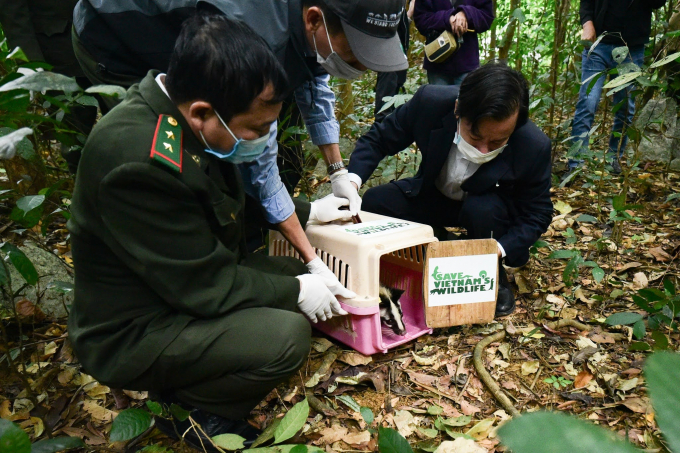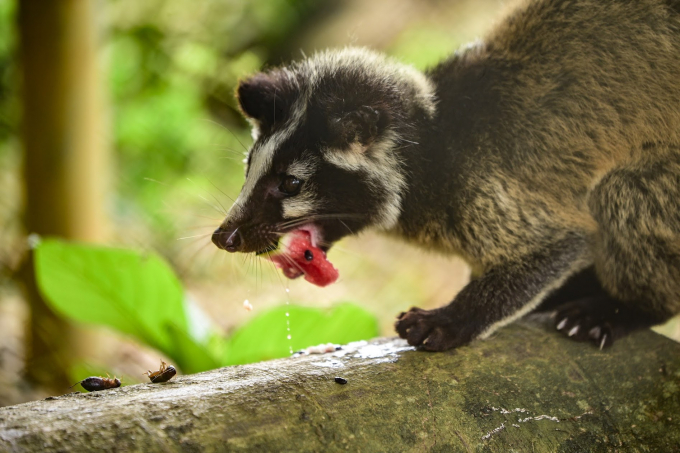November 27, 2025 | 22:24 GMT +7
November 27, 2025 | 22:24 GMT +7
Hotline: 0913.378.918
November 27, 2025 | 22:24 GMT +7
Hotline: 0913.378.918

A large number of masked palm civets were released into nature at Cuc Phuong National Park in an activity to secure the future of wildlife in Vietnam. Photo: Tung Dinh.
On May 9, 2022, MARD approved the document on the "Protecting endangered wild animals" technical assistance project funded by United States Agency for International Development (USAID).
The project aims to mobilize effective participation, coordination, and collaboration of related parties in order to increase the awareness and roles of leaders and managers to foster activities relating to saving threatened wildlife (STW) and to prevent illegal trading of STW, thereby reducing the demand for and consumption of illegal STW products.
On August 12, representatives of Management Board of Forestry Projects (MBFP), The Saving Threatened Wildlife project (STW), USAID and World Wild Fund (WWF) visited Vietnam Agriculture News and worked with the publication. The two parties consented that the project's specific objectives require the participation of all competent parties, the commitment of state management, sociopolitical organizations, professional groups, social-service organizations, and the general public in the fight against the illegal trade and consumption of STW.

The implementation of the "Protecting endangered wild animals" project requires the participation of all parties. Photo: Tung Dinh.
It is vital to enhance the capacity of law enforcement of all parties to conserve endangered species and combat illegal STW, as well as reduce the demand for illegal wildlife animals and product consumption.
Vietnam Agriculture News is projected to collaborate closely with Management Board of Forestry Projects, The Saving Threatened Wildlife project, USAID and WWF to execute a number of initiatives within the framework of the project in the near future. The project's activities consist of three components.
First, mobilizing the participation of competent parties and the commitment of state management leaders, sociopolitical organizations, sociopolitical professional groups, and the general public in the fight against the illegal trading of STW. The second component focuses on enhancing the management and law enforcement capacity of relevant parties in order to preserve, conserve endangered species and prevent illegal wildlife trade. Component 3 of the project aims to reduce illegal STW consumption.
Translated by Linh Linh

(VAN) According to Mr. Vo Minh Thanh, Director of the Tay Ninh Department of Agriculture and Environment, Resolution 57 has created a new development pathway for the locality, shifting from traditional toward modern agriculture.
/2025/11/26/4909-2-154329_878.jpg)
(VAN) Pearl grouper farming in HDPE cages not only delivers economic efficiency but also contributes to protecting the environment, creating jobs, and promoting marine-based experiential tourism.

(VAN) The model of making a living under the forest canopy through the agroforestry system in Van Son commune, Bac Ninh province, is expected to generate an annual income of approximately VND 30 million/ha.

(VAN) Many enterprises in Can Tho are harnessing natural energy and reducing greenhouse gas emissions in their production processes, thereby contributing to the promotion of a sustainable green transition.
/2025/11/24/3536-2-112800_176.jpg)
(VAN) Dong Nai now has tens of thousands of hectares of forests certified for sustainable management, and this area will continue to be expanded in the coming period.

(VAN) Vinh Ha hamlet (Dai Xuyen commune, Hanoi) is shifting away from small-scale farming as households adopt bioscurity into their breeder chicken models.

(VAN) Heavy rains make aquatic species more vulnerable to disease. Proactive water management and high-tech systems help farmers prevent outbreaks and protect yields.